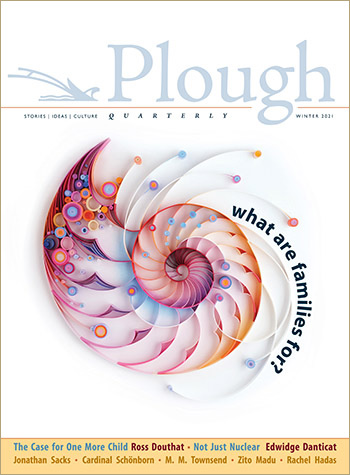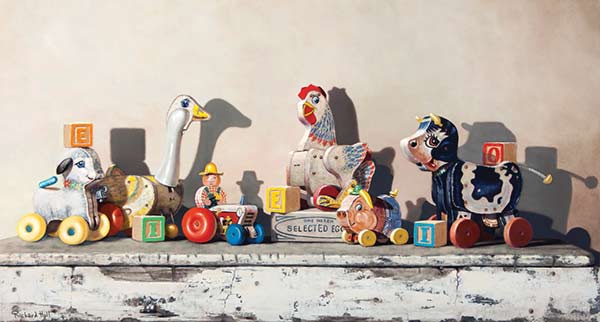Subtotal: $
Checkout-

Learning Generosity in Syria
-

A Tireless Peacemaker
-

Turning a Corner
-

Behind the Black Umbrellas
-

With Love We Shall Force Our Brothers
-

The Risk of Gentleness
-

The Great Escape
-

Militant Peacemaking
-

Peacemaking Is Political
-

Beyond Pacifism
-

A Life That Answers War
-

Excerpt: Freiheit!
-

Did You Kill Anyone?
-

Poem: “Candid”
-

Poem: “March Thaw”
-

The Minimalist
-

Call to Prayer, Call to Bread
-

Editors’ Picks: “Charis in the World of Wonders”
-

Editors’ Picks: “The Reindeer Chronicles”
-

Editors’ Picks: “I Ain’t Marching Anymore”
-

Editors’ Picks: “Floaters”
-

Poetry You Can Touch
-

Poem: “Annuals”
-

Poem: “The Widow Offers Herself to Life”
-

Poem: “Mary Magdalen Responds to the Harsh Judge”
-

Poem: “In Retrospect”
-

Poem: “A Backward Look”
-

Poem: “Where Nectar Was”
-

Felix Manz
-

Covering the Cover: The Violence of Love
-

The Case for Meekness

This Forum features selected responses to Plough’s Winter 2021 issue, “What Are Families For?” The Forum is a place for further conversation about the questions raised by our authors. Send contributions to letters@plough.com, with your name and town or city. Contributions may be edited for length and clarity, and may be published in any medium.
Singles in Church

On Gina Dalfonzo’s “Singles in the Pew”: I especially relate to this article on single people in the church. After twenty-four years of marriage, my former husband left me and our four teenage children. Suddenly, the church which had been at the center of our lives became a source of searing pain. Because my former husband and I were ministry leaders, the church was embarrassed and ashamed. We were the victims of gossip, condemnation, and awkwardness. They didn’t know what to do with us, visibly broken as we were, and the children and I no longer fit in with intact families.
If the church is to be a place for those who are broken, we must go the second mile to affirm, encourage, and include them. We need to look for creative ways to foster a sense of the family of God where the downtrodden can begin to heal. Our Father is faithful to his children, and the local church should be a reflection of him.
Thank you for including this article under the topic of family – living one’s life as a single is part of the whole picture; it is a reality for more than a few people. Gina Dalfonzo describes my own experience quite well. Even though I live among loving, caring families, the need to feel needed and the need for companionship are always there. I need encouragement and affirmation that a single life, lived for Christ and in His service, is a valid form of discipleship, just as those who are married need support and courage for marriage and parenting. As Christians, as brothers and sisters, we need each other; each person has something to give which another may need.
This is such a good reminder about why intentionality is important. I have been married for eight years and have one child and one on the way. But I was once single in the church as well. Presence was not automatic as it is for me now, and it is far too easy for families to get wrapped up in our own chaos. But I know that there is room in our chaos for more of our church family.
Being Present
On Zito Madu's “You Can’t Go Home Again”: I love your beautiful and poignant story. It stirred memories of my own and reminded me to be present as often as I can, in every way, because my own discomfort always gives way to the joy of others and in my own heart. Especially when I do the uncomfortable things.

Richard Hall, EIEIO Artwork by Richard Hall. Used with permission.
The Case for Babies
On Ross Douthat’s “The Case for One More Child”: Most people immediately throw out the possibility of having many kids and that’s very sad. Yes, they’re hard work; there are many days when I’m not sure how my husband or I get through with our sanity intact. I think a lot of people are underestimating themselves and don’t want to give up their lifestyle. They sacrifice the betterment of the children and society for their own selfish desires. I’m not saying that applies to everyone, but I think it can be applied to most families with only one child. They value stuff, things, monetary comfort more than the expanse of life that comes with a large family. I grew up in a small family, and I now have five kids. I’ve seen both sides. I’ll stand by my opinion.
What about the Christian’s obligation to adopt? How does that play into big families, population, and contraception? (Adoptive parents are not all infertile, as is widely believed!) These kids are already here! Great points about kids decreasing selfish tendencies in parents; I try to tell my nulliparous friends this and they think I’m crazy!
The only solution to climate change is technology. Clean energy, geoengineering, and carbon capture: the only way out is through. We need to become a rich and advanced enough society to be able to be proper stewards of the earth, and a growing population makes this easier. You only need to invent a technology once to spread it across the world, and the more people in rich countries, the more scientists and engineers we can support.
This article is thought provoking, and I agree with Douthat’s conclusion that we need a radical conversion of our hardened modern hearts, that siblings create the perfect first circle of socialization, and that parenting is one of the holiest callings of life.
With my husband I have parented birth, adoptive, and foster children. I am not sure that Douthat adequately addressed concerns of overpopulation, and I was surprised that he never raised the option of foster care. Overworked caseworkers in almost any state will happily fill your back seat. There will be considerably less temptation toward tribal narcissism and, when you are lucky, an expanded definition of extended family.
I loved two things about this article. The concept of children as a kind of everyman’s sanctification is very relatable; second, I think this is applicable to everyone, not just people who are in faith and community traditions where there are large families already. My wife and I jointly probably would have settled on 0–1 kids as our ideal, but we now have two and I love them both dearly.
My main struggle is how to care for the aging previous generation when their ideal was paradoxical: sending their children to far-off regions of the USA for economic advancement and expecting us to move back in their later lives. I don’t think that any of the articles in this issue addressed this other than to prescribe vague cultural ideals of accepting lower economic possibilities for the benefits of being closer to family.
Just came across this article. All I can say is I agree. I have five kids from nine to twenty-two. I'd probably have more if I could. Luckily I have my first grandchild (eight months old) to fill the gap. Have babies.
Besides, in a thousand years, no one will care about anything we did in our personal lives. The only measure of you will be how many descendants you have.
Two thoughts as a mom of three (who initially didn't want any kids and now wish I had more!)
I think technology can plan so much for us that young people get used to never being out of control: always knowing the weather forecast, how to get somewhere, what you'll do when you get there, realistic career paths, etc. Getting pregnant and having a kid is almost entirely out of your control.
I also think what many women don't anticipate is that how many kids you want changes over time. At thirty-two you may think you just want one, at most two, and then you find yourself six years later yearning for a third and at the tail end of your fertility.
Thanks for bringing this issue up. We always felt that our family made a difference for children who were the “left behind”. We reared two children who were “street children” and have continued to be our children. There were times when we had seven children, when [their] mothers were suicidal. In those days there was no social services working at this level. We believe children must be seen in new ways.
With only a slight, rather sneering nod to people concerned about the climate, does Douthat look forward to ever more billions of people somehow beating the earth into submission? But the earth is the Lord’s, and the Lord evidently did not create it submissive. A few large families, genuinely loved and well provided for, is great. Large families as the norm, in a no-longer-agrarian society where aging into the eighties is usual, is plainly unsustainable. When the overall human population is both of the right size and of the spiritual commitment to live in harmony with the rest of creation rather than exploiting it (see Psalm 104), then large families will be both delightful and sensible again. Especially so if we dads pull our weight at home, and share in that deepest human joy, caring for children.
Treasure the Weak and Vulnerable
On Leah Libresco Sargeant’s “Dependence”: I have read and reread Leah Sargeant’s essay about treasuring the weak and vulnerable. Thank you for this reminder to see human helplessness as God does! A verse from Zechariah 8 comes to mind: “Thus says the Lord of Hosts: Old men and old women shall again sit in the streets of Jerusalem, each one with his staff in his hand because of great age. The streets of the city shall be full of boys and girls playing in its streets.” Contrast this with Hitler’s vision for Germany: old, unproductive people cleared away to make room for workers in their prime while children are herded together and trained to become desirable citizens. But the true strength of a society lies in its care for the weak. God’s holy city does not have streets cleared for commerce. The oldest and youngest citizens – those whose needs outbalance their productivity – are in the middle of everyday life. This is the real mark of a thriving city and a flourishing church, when the dependent are welcomed and celebrated.

Yulia Brodskaya, Feather, paper quilling Used with permission.
Beyond the Entrenched View
On Sarah C. Williams’s “The Praying Feminist”: Josephine Butler’s efforts remind me of the particular power of prayer to help us reimagine the world, ourselves and others, and our relationship with God, and move us beyond an entrenched and negative view of the world. I am also reminded of Ron Hansen’s protagonist in “Mariette in Ecstasy” and her relationship with God: “We try to be formed and held and kept by him, but instead he offers us freedom. And now when I try to know his will, his kindness floods me, his great love overwhelms me, and I hear him whisper, Surprise me.” God allows us to dream big, but how often do we take him up on his offer of freedom? It sounds like Josephine Butler did.
Good Masculinity
On Noah Van Niel’s “Manly Virtues”: Noah Van Niel is right to seek a nuanced response to the “crisis of masculinity.” For, as he says, many Christians respond by mixing the gospel with a defence of “traditional masculinity” that is not very Christian. But how should Christian men respond to the social changes behind the crisis? It is surely important to articulate a positive and hopeful response.
We have lived through a major cultural revolution. Because it is a matter of cultural politics rather than the governmental sort, its scale is easily overlooked. When my parents married, in the 1960s, both genders came in fairly firm cultural boxes. You had some freedom to move around in your box, but you didn’t think of leaving it any more than a tortoise thinks of leaving its shell. The old gender roles exaggerated the slight physical difference between men and women. Men were stronger in a wide sense – tougher, more worldly, more able to earn more money, and to think clearly. Women were softer, sillier, in need of protection. In the 1970s this set-up began to be seriously challenged, and then was overthrown. A shift this huge brings immense trauma as well as liberation and excitement – and most, but not all, of the trauma has fallen on men, robbed by feminism of their old aura of mastery.
I think that we should acknowledge this trauma, and also frame it in positive terms. That means acknowledging that the revolution was basically necessary and good. Those old boxes were bad for both sexes. They shaped us, but also constricted us. It also means seeing the resulting trauma as a process of painful growth and healing, a form of purgatory.
We should not drop our critical impulses – even good revolutions have sharp dangers. Van Niel wonders whether any blame lies with “the militant feminism that makes men feel like criminals before they do anything wrong.” I think this slightly misses the point. The real dubious force of the revolution is not that it casts men in a negative light; the real danger is subtly different. We live in a culture of exaggeration, a.k.a. idolatry – it doesn’t know how to celebrate a morally virtuous movement without childishly pretending that it is divinely good, and that any perceived opposition is evil. And so, in our secular but not very rational age, feminism takes on a cultic aura; it implies that moral and spiritual significance resides in this gender rather than the other one. And this causes real and dangerous resentment.
I’m left with a big question: What distinguishes Van Niel’s view of positive masculinity from a positive femininity? If Jesus is the role model for men, who is the role model for women? Are not all Christians meant to emulate Jesus, whatever their gender? Compassion, humility, and purpose: I have no argument with encouraging men to aspire to these virtues, but I see nothing essentially masculine in them. It seems to me that he is writing about “how to be truly human” (as one of the online comments on the article put it). I remain interested in the question of what does, or should, define a positive masculinity, and remain uncertain as to whether it is actually distinguishable from a positive femininity.
The essay is an illuminating overview of current cultural debates and misguided Christian perspectives on masculinity. In that respect, Van Niel’s analysis is on target. However, he leaves us with an unsettled question: What outlook and behaviors, if any, are specifically “masculine”? Van Niel proposes that to express Christian manliness, a man must stay true to Jesus’ compassion, humility and purpose. This is a welcome corrective to faulty cultural assumptions about manliness. Still, does Van Niel mean to imply that women cannot manifest these same virtues? Given the tone of his essay, I don’t imagine so.
Is it possible to be Christlike in ways that are distinctively masculine? The notion has its appeal. Certain traditional expectations (e.g., that men will be decisive) are satisfying to many people of either gender. Can we affirm such qualities in men without treating them as if they’re more naturally a male characteristic? Undoubtedly, more sorting-out of these matters lies ahead. Ultimately, though, I believe we’ll have to acknowledge that there’s no ideal combination of “Christian” and “masculine.” In God’s design, there’s too much variety among us to allow for such neat categories. For each of us, gender – along with our other traits and gifts – will have its role in shaping our unique Christian witness. As these various influences join together, may we each discover how to be Christlike in ways that express our own makeup and complement the gifts of others.
Already a subscriber? Sign in
Try 3 months of unlimited access. Start your FREE TRIAL today. Cancel anytime.









































MICHAEL NACRELLI
I must respectfully disagree with Hobson's view that the obliteration of male-female distinctions resulting from the sexual revolution is a positive cultural development.